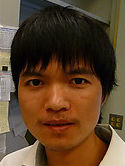A unique binding mode enables MCM2 to chaperone histones H3-H4 at replication forks Journal Article
| Authors: | Huang, H.; Strømme, C. B.; Saredi, G.; Hödl, M.; Strandsby, A.; González-Aguilera, C.; Chen, S.; Groth, A.; Patel, D. J. |
| Article Title: | A unique binding mode enables MCM2 to chaperone histones H3-H4 at replication forks |
| Abstract: | During DNA replication, chromatin is reassembled by recycling of modified old histones and deposition of new ones. How histone dynamics integrates with DNA replication to maintain genome and epigenome information remains unclear. Here, we reveal how human MCM2, part of the replicative helicase, chaperones histones H3-H4. Our first structure shows an H3-H4 tetramer bound by two MCM2 histone-binding domains (HBDs), which hijack interaction sites used by nucleosomal DNA. Our second structure reveals MCM2 and ASF1 cochaperoning an H3-H4 dimer. Mutational analyses show that the MCM2 HBD is required for MCM2-7 histone-chaperone function and normal cell proliferation. Further, we show that MCM2 can chaperone both new and old canonical histones H3-H4 as well as H3.3 and CENPA variants. The unique histone-binding mode of MCM2 thus endows the replicative helicase with ideal properties for recycling histones genome wide during DNA replication. |
| Keywords: | controlled study; unclassified drug; dna replication; protein domain; cell proliferation; complex formation; protein dna binding; mutational analysis; histone h3; genome; crystal structure; protein structure; structure analysis; tetramer; chaperone; nucleosome; histone h4; dimer; minichromosome maintenance protein 2; priority journal; article; centromere protein a; asf1 protein; dna histone interaction |
| Journal Title: | Nature Structural and Molecular Biology |
| Volume: | 22 |
| Issue: | 8 |
| ISSN: | 1545-9993 |
| Publisher: | Nature Publishing Group |
| Date Published: | 2015-08-01 |
| Start Page: | 618 |
| End Page: | 626 |
| Language: | English |
| DOI: | 10.1038/nsmb.3055 |
| PROVIDER: | scopus |
| PUBMED: | 26167883 |
| PMCID: | PMC4685956 |
| DOI/URL: | |
| Notes: | Export Date: 2 September 2015 -- Source: Scopus |
Altmetric
Citation Impact
BMJ Impact Analytics
Related MSK Work






